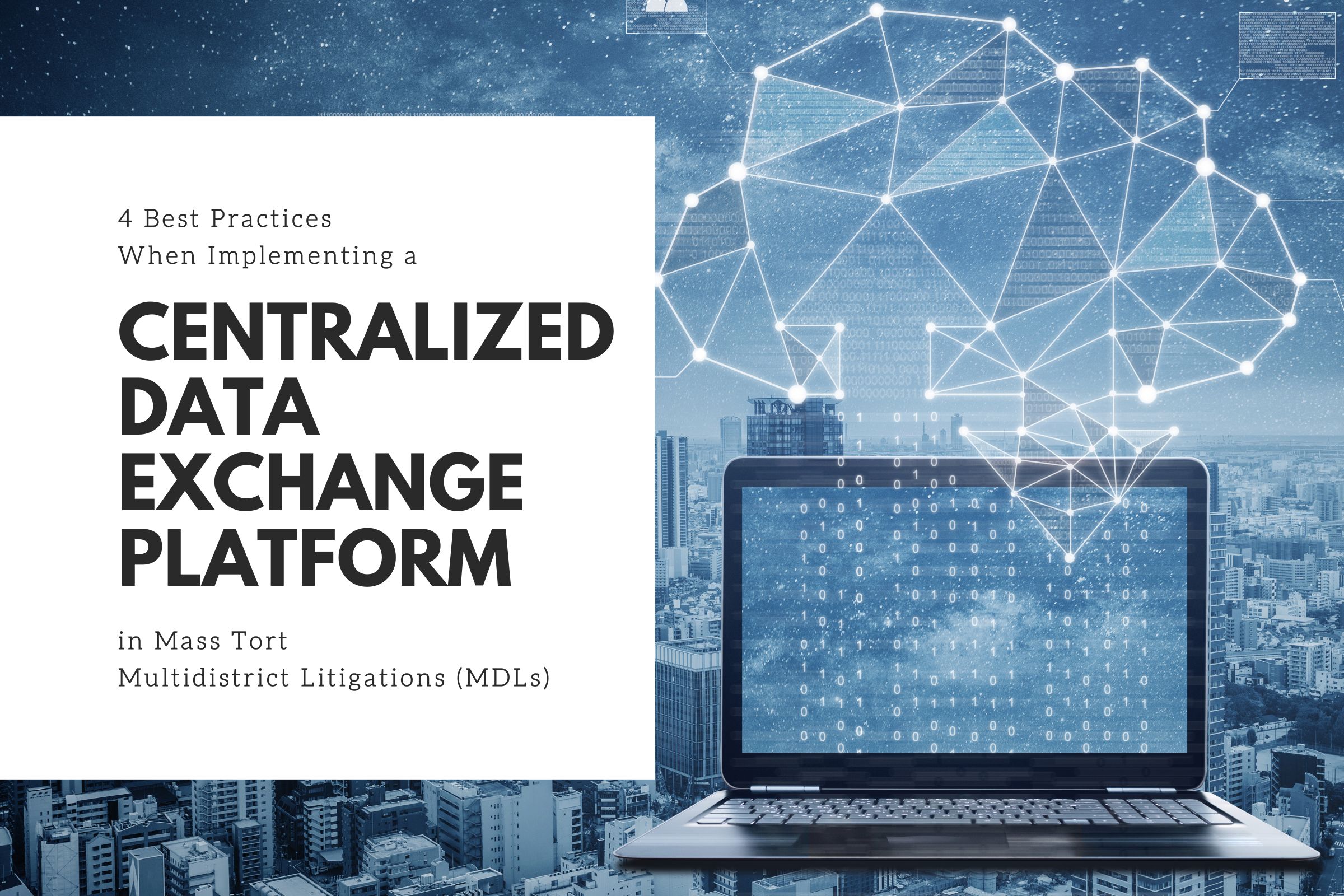What is a Centralized Data Exchange Platform?
A centralized data exchange platform is a dynamic, central online exchange platform tailored to case-specific needs in mass tort litigation to facilitate the exchange, storage, access, search, and analysis of data and documents between parties.
Mass tort multidistrict litigation (MDL) consists of many individual claimants represented by many law firms and lawyers and can involve hundreds of gigabytes, even terabytes of data and documents. A centralized data exchange platform is ideal for parties on both sides of the bar, in-house counsel, law firms, insurers, judges, experts, and more.
Centralized data exchange platforms in mass tort MDLs can eliminate duplicative work by both the defense and plaintiffs resulting in a reduction of time and expenses for both sides. Until recently, both sides have had to separately manage their own document management solutions.
4 Best Practices When Implementing a Centralized Data Exchange Platform
- Discuss the development and implementation early in the litigation
- Outline the case use in a Case Management Order (CMO)
- Confirm access and security measures
- Determine payment responsibility and terms
1. Discuss the development and implementation of a centralized data exchange platform in mass tort MDL cases as early as possible
Parties should begin the discussion for centralized data exchange platform consideration as early as possible in the litigation. Discussions should begin before the first case management conference.
Because each MDL is different, centralized data exchange platforms need to be customized to fit the specific needs of the litigation and be operational before discovery is exchanged. Representing attorneys should vet service providers with relevant experience and request introductory consultations to prepare for the case conference.
2. Outline the case use for a centralized data exchange platform in a Case Management Order (CMO)
If the court approves the recommendation of using a centralized data exchange platform for data and document management, a CMO should be entered to mandate the use of the platform by all parties in an MDL. This will enforce user adoption of the technology and provide the most effective results.
The order should appoint a platform administrator and outline items such as the intended purpose, goals, benefits and deliverables, and party access while clearly defining the expectations and guidelines for the use of the centralized data exchange platform. Consider outlining security requirements, policies, and responsibilities for the platform service provider. Data privacy and security measures should also be addressed in the selection of the platform provider.
3. Confirm access and security measures for the centralized data exchange platform
One of the many benefits of a centralized data exchange platform is the ability to define multiple security roles for user access. These security roles will limit the level of accessibility a user has to certain entities, data, documents, reports, etc. These security roles are assigned to different users depending on their role in the litigation.
A centralized data exchange platform can be used to communicate important litigation-related notifications. Examples include:
- Firm enrollment
- Exchange of communication between Lead Plaintiffs' Counsel, Committees, Defense Counsel, Special Masters, mediators, and judges
- Exchange of alerts, notices, updates, and reports
- Record access
- Review of exhibits and rule on exhibit motions
- Access to all cases for trial
- Access to information for settlement negotiations
- Access to remanded cases
4. Determine payment responsibility and terms for the centralized data exchange platform
Both plaintiffs and defendants benefit from the use of the centralized data exchange platform. The cost of the platform is typically equally shared. There will be instances where a particular feature is requested by one side and not used by the other. In these scenarios, parties should discuss the allocation of costs during the first case management conference when the platform is initially discussed.
Litigation is unique. Every MDL requires different types and levels of management functions within a centralized data exchange platform. These functions are customized to fit the parties and court's needs in the litigation. The parties hold the power to design an effective and efficient centralized data exchange platform. Selecting the right service provider partnership plays a critical role.
How can LMI help?
LMI is involved in most of all pending Mass Tort Product Liability MDLs. Built on nearly 40 years in the litigation management industry, we know how to save parties time and money. Feel confident in your litigation strategy with data-based facts.
Contact us today for a consultation.
